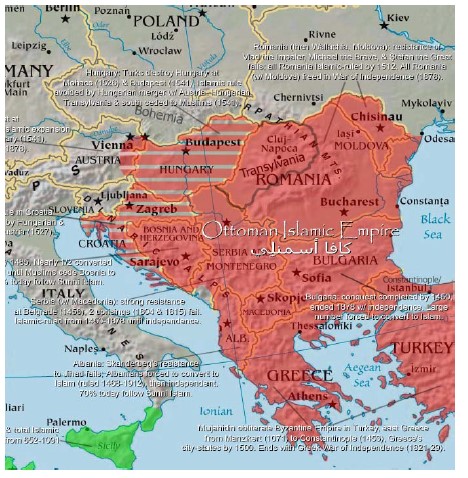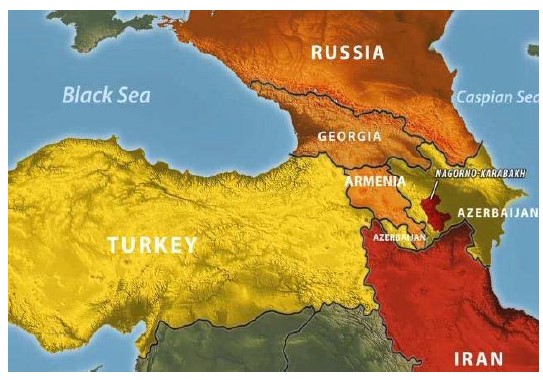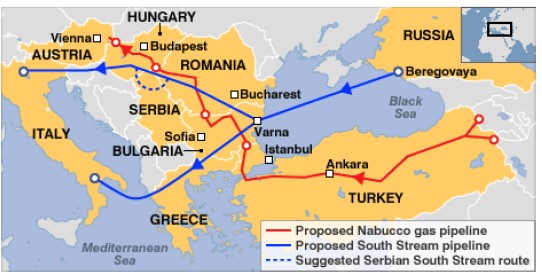QuranCourse.com
Muslim governments have betrayed our brothers and sisters in G4ZA, standing by as the merciless slaughter unfolds before their eyes. No current nation-state will defend G4ZA—only a true Khilafah, like that of the Khulafah Rashideen, can bring justice. Spread this message to every Muslim It is time to unite the Ummah, establish Allah's swth's deen through Khilafah and revive the Ummah!
The End Of American Century by Adnan Khan
Turkeys Phoney Resurgence
A number of analysts have described Turkey’s recent assertiveness as a new resurgence with the nation playing a leading role in a number of international issues. With the 15th largest economy in the world, Turkey’s geographical location has turned the country into a energy hub between the East and the West. Some have even used the term TRIC, rather than BRIC, which was originally coined by Goldman Sachs in a 2005 report when describing the new upcoming nations. Various experts are now describing Turkey's ascendency as neo-Ottomanism.
Stratfor said:
“Turkey, like Russia, is also on an ascendant path. Ankara is rediscovering its Ottoman-era influence after spending the past several decades as a geopolitical hermit. Its influence spreads across the Islamic world to the Middle East, Central Asia and South Asia as well as through Eurasia in the Caucasus and the Balkans. What we have is a careful Turkish strategy that involves probing into its various surrounding regions, attempting to take advantage of potential opportunities. Where the Turks find resistance, they retreat. In places where they encounter little or no resistance, they advance. These very preliminary and exploratory moves will define Turkish attempts at geopolitical revival for some time to come.”19
John Feffer, co-director of Foreign Policy In focus said:
“Turkey promptly becomes a likely candidate for future superpower. It possesses the 17th top economy in the world and, according to Goldman Sachs, has a good shot at breaking into the top 10 by 2050. Its economic muscle is also well defended: after decades of assistance from the North Atlantic Treaty Organization (NATO), the Turkish military is now a regional powerhouse. Perhaps most importantly, Turkey occupies a vital crossroads between Europe, the Middle East and Central Asia. A predominantly Muslim democracy atop the ruins of Byzantium, it bridges the Islamic and Judeo-Christian traditions, even as it sits perched at the nexus of energy politics. All roads once led to Rome; today all pipelines seem to lead to Turkey. If superpower status followed the rules of real estate - location, location, location - then Turkey would already be near the top of the heap.”20
World Power
In 1453 the Ottoman’s concluded the conquest of Constantinople, the Byzantine capital. This brought to an end all remnants of Roman rule, who had been the world’s superpower for nearly four centuries. The Ottoman’s were one of the many bands of Turkmen horsemen who began to come into the Islamic lands as a result of the Mongol invasions in the 13th century. These Turkmen warriors, who had converted to Islam, were sent to the frontiers of the state by the Seljuks, who themselves were of Turkish origin. They had excellent fighting skills and zeal, which the Seljuks wanted them to apply along the frontier with the Byzantines. The house of Uthman proved to be one of the most successful of these bands, taking many towns and villages from the control of the Byzantines, they then unified the other ghazis, under their banner, brought the lands surrounding Constantinople under Islam, culminating in the capture of Byzantine Empire capital - Constantinople in 1453.

The Ottoman’s swept through the Balkans and Eastern Europe in spectacular fashion. The important city of Thessaloniki (Macedonia) was captured from the Venetians in 1387. In 1389, the kings of Austria, Bulgaria, Bosnia and Hungary attacked the Ottoman’s but Sultan Murad I crushed them at Kosovo, which shocked Europe. In 1396, the whole of Europe including French and German armies fought against Sultan Bayazid Yaldram at Nicopolis but were comprehensively defeated and 20 rulers and dignitaries were brought to the Khaleefah’s court as the captives. Sultan Bayazid had annexed all the territory from Bosnia to Danube. He had also conquered Greece (Athens) in 1398.
Before Suleiman al Qanooni's reign came to an end in 1566 he had expanded the Islamic frontiers well into Eastern Europe bringing Belgrade the capital of Serbia under Islam as well as regaining the Greek island of Rhodes. He had defeated Louis II of Hungary and Bohemia and brought most of Hungary under Islamic authority. By 1578 Georgia and what is today Romania was under Islam. Before the beginning of the 17th century the Ottoman’s had brought Southern Italy, Hungary, Austria, Romania, Macedonia, Bulgaria, Albania, Malta, Cyprus, Croatia, Ukraine, the Canary Islands, parts of Iceland and the largest island of the Bristol waters in England, UK - Lundy under Islamic authority.
Such was the perceived threat of the Ottoman Khilafah under the reign of Suleiman al Qanooni that ambassador Busbecq of the Austrian monarch Ferdinand I warned of Europe's imminent conquest: "On [the Turks'] side are the resources of a mighty empire, strength unimpaired, habituation to victory, endurance of toil, unity, discipline, frugality and watchfulness... Can we doubt what the result will be?...When the Turks have settled with Persia, they will fly at our throats supported by the might of the whole East; how unprepared we are I dare not say."21
Turkey was a superpower previously when the Ottoman’s managed to unite many of the lands around Western Turkey. They removed the Byzantine Empire as the world’s superpower and menaced Europe for centuries. Since the destruction of the Khilafah elements within Turkey have worked to remove the nations Islamic roots, Turkey became aligned to the West, joined NATO, protected US aims during the Cold War and is attempting to join the European Union (EU).
Justice and Development Party (AKP)
Ever since Abdullah Gul and Recep Tayyip Erdogan left the Virtue party and formed the Justice and Development Party under the leadership of Erdogan, they both began cementing ties with America in order to remove the influence of Britain and its ties with the Army. Whilst many reforms have been introduced to break the armies hold on power the centrepiece of the AKP’s strategy was the ‘Shared Vision Document’ signed between the Turkish and American government by Abdulla Gul and Condoleezza Rice on 5th July 2006. The meeting confirmed: "The strategic vision document confirms Turkish-US consensus to translate our shared vision into common efforts through effective cooperation and structured dialogue."22 The AKP and the US agreed to amongst a number of issues:
1.Supporting international efforts towards a permanent settlement of the Arab-Israeli conflict, including international efforts to resolve the Israeli-Palestinian conflict on the basis of a two-state solution.
2.Supporting diplomatic efforts on Iran's nuclear program, including the recent P5+1 initiative Contributing to stability, democracy and prosperity in the Black Sea region, the Caucasus, Central Asia and Afghanistan.
3.Enhancing energy security through diversification of routes and sources, including from the Caspian basin.
A US House of Representatives Committee on Foreign Affairs hearing entitled The United States and Turkey: A Model Partnership under the chairmanship of the Head of the Subcommittee on Europe Robert Wexler was convened following, the historic visit Obama paid to Turkey in April 2009, concluded that, “This cooperation is vital for both of the two states in an environment in which we face serious security issues in Afghanistan, Iraq, Iran, the Balkans, Black Sea, Caucuses and the Middle East, besides a global financial crisis.”23
Caucuses
Turkey under the Uthmani Khilafah fought and lost a number of wars in the 18th and 19th centuries which led to the Ottoman’s to cede territory to Russia. The collapse of the Ottoman Khilafah in 1924 led to a number of incidents with Armenia - which have come to be known as the Armenian massacre. This defined the hostile relations between the Caucasian nations and Turkey. Today both Russia and Turkey are working to gain a foothold in the region.
Turkey is currently in the middle of a lengthy process to normalise relations with Armenia. Normalising ties includes the opening of the shared border. The talks have gone through a number of summits and discussions, which has produced protocols both nations have signed. The protocols however remain stuck in both Turkish and Armenian parliaments due to the resistance in both nations by certain elements. The outcome of such negotiations is intrinsically linked to Azerbaijan who wants the Nagorno-Karabakh territory to be resolved under any agreement between Armenia and Turkey.

The Nagorno-Karabakh territory was given independence in the dying days of the Soviet Union. It is a territory that both Armenia and Azerbaijan lay claim to. The territory continues to plague relations between Armenia and Azerbaijan as both have gone to war on a number of occasions over the territory. Currently negotiations are taking place between Azerbaijan and Armenia mediated by Russia. Russia’s resurgence has meant that it is expanding into the Caucuses again and working to bring its former republics under its influence once again. The Caucuses is important to Russia as it acts as buffer zone between Russia and other regional powers. Russian influence and control over the nations that comprise the Caucuses prevents other powers from gaining a foothold in the region.
Azerbaijan has doubts over the importance Turkey places upon its claims to the territory. This has resulted in Azerbaijan turning to Russia’s mediation. Russia has been able to play Azerbaijan, Armenia and Turkey off each other. This strategy by Russia also places an obstacle in the apparent ascendency of Turkey as it prevents it from a direct supply line to the energy of the Caspian Sea, which prevents Europe from accessing those resources as it attempts to circumnavigate around its dependence on Russia’s energy.
Turkey has become a strategic reinsurance for Georgia through its direct contact with the Government of Abkhazia. For Georgia Turkey’s commerce with Abkhazia and South Ossetia helps Abkhazia from total Russian domination.24
Energy
Turkey's geographic location has turned it into a conduit for energy. Straddling Europe and Asia, Turkey's Ports receive crude oil and natural gas which is then refined and sold to European markets. Turkey has regularly advocated European energy projects, like Nabucco, that circumvent the Russian network. As one analyst put it: "The other more secure corridor for European energy diversification is Turkey - already an end point for two major pipelines from the Caspian. Turkey's Mediterranean port of Ceyhan supplies Europe with much needed alternative oil. But while Turkey has the potential to become an energy hub for Europe, there is much work left for the EU. The first order of business would be a diplomatic offensive to realize the Nabucco gas pipeline from Turkey to Austria through Bulgaria, Romania and Hungary. This project would provide another key alternative route for Caspian resources to reach Europe to begin to ameliorate overdependence on Russia."25

Russia’s use of its energy resources as a foreign policy tool has seen Ukraine, Lithuania and subsequently Europe being held hostage by the former world power. Europe and especially France and Germany’s dependency on Russia's energy hydrocarbons has been exposed one too many times and Turkey currently represents the only alternative to Russian energy dependency.
Middle East
Turkey is not part of the P5 + 1 nations who are attempting to construct a sanctions programme against Iran for enriching Uranium. The US has reneged all deals and agreements that have been reached which has allowed the Iran nuclear issue to escalate to the level it has. This shows that the US has no intention of solving this conflict and it has actually ensured no solution is ever reached. The US achieves a number of its aims in the region through this diplomatic crisis. America has gained a strategic advantage by providing security to the Gulf Arab countries in the face of Iran's rhetoric; it has also forced the Israelis into a security pact. Turkey and Brazil’s nuclear fuel swap proposal to de-escalate the Iranian nuclear controversy took place on the same day when the US was tabling sanctions against Iran. Turkey various positions in the Middle East are no different to America’s, Turkey agrees with the two state solution and has actively participated in the indirect talks to kick start the peace process. Similarly America needs nations it can rely on to extricate itself from Iraq and Turkey has been more than happy to play the patron. Stephen Larrabee, Corporate Chair in European Security at the RAND Corporation said regarding Turkey’s role in the Middle East “Turkey's new activism is a response to structural changes in its security environment since the end of the Cold War. And, if managed properly, it could be an opportunity for Washington and its Western allies to use Turkey as a bridge to the Middle East.”26
This is exactly what took place with regards to the nuclear enrichment deal Turkey and Brazil reached with Iran. The US for long has used the Iranian nuclear stand off to achieve its other aims in the region. With European pressure increasing on sanctions, America achieved an alternative deal with Iran in the face of stiff European pressure with the non-permanent members of the United Nations over the permanent members.
Phoney Resurgence
Turkish assertiveness is anything but independent. Since the end of WW2, throughout the Cold War and Gulf wars Turkey has sided with the US. Currently the Caucuses is a hot spot where a resurgent Russia is looking to bring its former republics under its influence and create a buffer zone to protect the Russia interior. Turkey in reality whether independently or by design is not just protecting US interests but also European interests. By forging relations with the nations of the region Turkey is attempting to complicate Russian interests, which is the US strategy in the region.
In the area of energy Turkish independence and manoeuvring is highly questionable when the West on many occasions has presented Turkey as the alternative to Russia. It appears Turkey is in reality protecting European energy interests and subsequently US interests in ensuring Russian influence doesn’t gain any momentum.
Similarly Turkish mediation between Syria and Israel in solving the Palestinian conflict is not a resurgent Turkey looking to shape the politics of the region according to its aims but rather it comes under US attempts to start indirect talks between Israel and the Muslim nations of the region to normalise relations after a decade of no progress on the peace process and as the US attempts to extricate itself from Iraq and Afghanistan.
Conclusions
Turkey has very limited energy resources, but because of its strategic location between Europe and Asia and between oil consumers and oil producers, it is crossed by several major oil and gas pipelines. Turkey’s geographical location makes it a natural trans shipment route between the major oil producing areas in the Middle East, Central Asia, and the Caucasus on the one hand, and consumer markets in Europe on the other. As a result Turkey has developed an advanced mineral processing industry and is a world leader in many key metals and chemicals. Turkey is also one of the world’s largest agricultural producers.
Rather then protecting the needs of other nations, Turkey is in pole position to become a world power through pursuing an independent foreign policy. The current assertiveness many analysts describe as a ‘resurgence,’ could not be further from the truth, this is because Turkey is only manoeuvring within the space the US has permitted it. Turkey's mediation in the Palestinian issue takes place when the US has decided indirect negotiations should take place on the final settlement. Similarly America's policy of containing Russia and pushing Russian assertiveness all the way back into Russian territory has seen Turkey play a leading role in the Caucuses to complicate Russian aims. Turkey's has been repaid by the US by the House Foreign Affairs Committee passing a resolution condemning Turkey for the apparent role of the Ottoman’s in the Armenian Genocide.
Whilst Turkey continues to reform itself in order to be welcomed into the international arena America continues to use Turkey for its aims and the European Union continues to delay Turkey's ambition to join the EU. Until Turkey takes lessons from its history, where it was a superpower and construct independent polices it will never be a world power.
Reference: The End Of American Century - Adnan Khan
Build with love by StudioToronto.ca